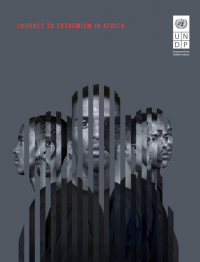9 September 2017 : a 128-page UNDP report “Journey to Extremism in Africa” presents the results of a two-year UNDP Africa study aimed to generate improved understanding about the incentives and drivers of violent extremism, as expressed by recruits to the continent’s deadliest groups themselves.
What strategies work to counter terrorism effectively, whether in Africa or anywhere else in the world? Few would claim to have a convincing answer to that question. However, there is some real evidence of what strategies do not work and are even counterproductive. For example, the new UNDP study studying recruitment to violent extremism, based on interviews with former extremists in Nigeria, Kenya, and Somalia, found a number of factors underlying the growth of violent extremism. Particularly striking was the finding that 71 percent of recruits interviewed said that it was some form of government action that was the ‘tipping point’ that triggered their final decision to join an extremist group.
Those interviewed cited incidents such as ‘killing of a family member or friend’ or ‘arrest of a family member or friend’, as the incident that prompted them to join. These findings throw into stark relief the question of how counter-terrorism and wider security functions of governments in at-risk environments conduct themselves with regard to human rights and due process. State security-actor conduct is revealed as a prominent accelerator of recruitment, rather than the reverse. (Source: African Focus)
Here the link: http://journey-to-extremism.undp.org/content/downloads/UNDP-JourneyToExtremism-report-2017-english.pdf










No Comments